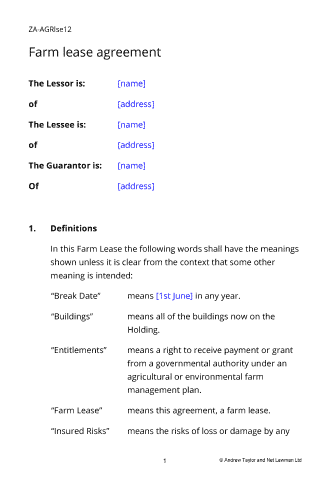Farm lease agreement

Document overview


- Length:20 pages (5750 words)
- Available in:
 Microsoft Word DOCX
Microsoft Word DOCX Apple Pages
Apple Pages RTF
RTF

If the document isn’t right for your circumstances for any reason, just tell us and we’ll refund you in full immediately.

We avoid legal terminology unless necessary. Plain English makes our documents easy to understand, easy to edit and more likely to be accepted.

You don’t need legal knowledge to use our documents. We explain what to edit and how in the guidance notes included at the end of the document.

Email us with questions about editing your document. Use our Lawyer Assist service if you’d like our legal team to check your document will do as you intend.

Our documents comply with the latest relevant law. Our lawyers regularly review how new law affects each document in our library.
About this farm lease agreement
This lease creates a farm lease agreement. It is comprehensive with a choice of 62 positive obligations and restrictions on the lessee to ensure that the land is used as the lessor wishes. The term of the lease can be between 6 months and 60 years with regular rent reviews.
The law in this document
This document complies with property law.
When to use this lease
This document should be used if:
- All or part of the land is farmed for trade or business throughout the lease;
- If the circumstances of occupation suggest that the character of the tenancy is primarily agricultural.
“Agricultural business” refers to using all or part of the property to grow plants (crops) or rear animals with a view to sale. The scale of the business is not important: the same tenancy laws apply whether the property is a commercial dairy farm with hundreds of acres of pasture, or 10 metres of poly-tunnel under which a prize garden plant is cultivated.
Farming encompasses all sorts of businesses, from those growing crops in fields (including grass, hay or silage), to those where the crops are grown in an orchard or under glass (e.g. rhubarb or mushrooms), to those where the "crop" is an animal (e.g. lamb farming) or a product derived from animals (e.g. milk). Keeping animals (e.g. grazing horses on the land) in itself is not an agricultural business but horse breeding is. A garden centre is not an agricultural business, but plant growing is.
Change of use may be anticipated and will not necessarily disqualify the agreement, if notice has been served. The lawdoes not make clear how far diversification may go. However, it has now become clear that peripheral or additional business operations will not prevent a tenancy from being a farm lease, for example, operation of a farm shop or a camp site. In any case, any diversification of use other than farming is likely to require the consent of the lessor.
Examples of lessees who might use this lease include:
- A wheat farmer renting additional land;
- A dairy farmer renting the land and outbuildings;
- Someone grazing animals on the land;
- Someone running a horse stud as a 'hobby' business and using the land or buildings for keeping horses;
- A brewer who grows the apples on the rented land and makes the cider in an outbuilding;
- A plant grower who sells his plants from a building on the site;
- A mushroom grower using one of the outbuildings to develop a new breed for commercial sale.
Document features and contents
This lease comes with a menu of over 62 options to empower or restrict the lessee. The terms have been carefully considered to protect the lessor's interests while remaining fair to the lessee.
The document has 23 sections and 3 schedules, which include:
- The farm lease
- Rent and other payments: including further payments and interest on late payments;
- Rent review;
- Lessee's positive obligations and restrictions: a menu of 62 items;
- Entitlements;
- Assignment: lessee may not assign the lease or sublet the property;
- Redundant buildings: not required to be maintained;
- Lessee's fixtures;
- Insurance: choice for the lessor to be responsible, or for the lessee to be responsible;
- Access for the lessor;
- Indemnity: lessee indemnifies the lessor;
- Termination: including notice period, and events at and after termination;
- Forfeiture;
- Guarantor: essential if the lessee is a company;
- Other matters;
- Schedule 1: rights reserved;
- Schedule 2: redundant buildings;
- Schedule 3: lessee's incoming fixtures.

Recent reviews
Have had quick personal responses every time I’ve needed support.
Choose the level of support you need
Document Only
This document
Detailed guidance notes explaining how to edit each paragraph
Lawyer Assist
This document
Detailed guidance notes explaining how to edit each paragraph
Unlimited email support - ask our legal team any question related to completing the document
- Review of your edited document by our legal team including:
- reporting on whether your changes comply with the law
- answering your questions about how to word a new clause or achieve an outcome
- checking that your use of defined terms is correct and consistent
- correcting spelling mistakes
- reformatting the document ready to sign
All rights reserved
